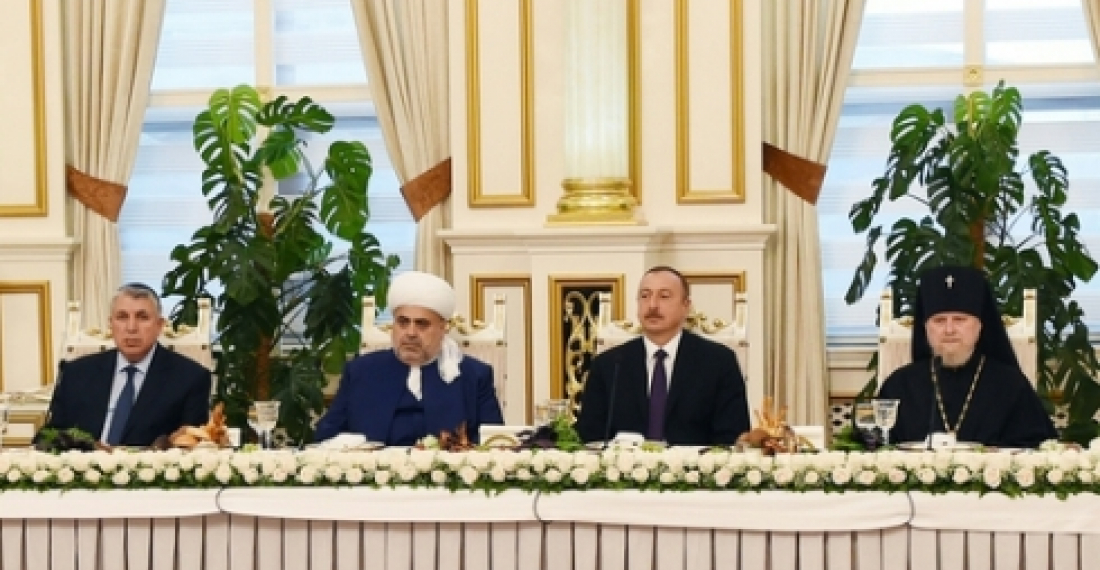President Ilham Aliev of Azerbaijan and president Serzh Sargsyan of Armenia have both spoken about the current state of negotiations on the Nagorno-Karabakh conflict ahead of their meeting on Monday in St Petersburg with Russian President Vladimir Putin
APA news agency reports from Baku that President Aliev addressed the issue whilst speaking at an Iftar ceremony marking the Holy Muslim month of Ramadan hosted by the Chairman of the Board of Caucasus Muslims Sheikh-ul-Islam Allahshukur Pashazade on Friday, (17 June). Aliev refereed to the fighting that took place in the Nagorno-Karabakh conflict zone in April and said that it was "a signal to the mediators and to the world community that it is not a frozen conflict". The Azerbaijani president added, "if someone believes that we will continue to negotiate meaninglessly in the next twenty years, he is mistaken. We do not intend to conduct negotiations meaninglessly. We will not negotiate for the sake of imitation. We expect immediately and unconditionally to begin meaningful and substantive talks. In this case, can expect a peaceful solution to the issue".
President Aliev said that in May there was a meeting in Vienna and that this will be followed up next week in Saint Petersburg. "We hope that this issue can and must find a solution through peaceful means. To achieve this, Armenia should abandon its aggressive policy and liberate our lands", the President said.
In the meantime the Armenian newspaper Hraparak, quoted by news.am, reported that Armenian president Serzh Sargsyan spoke about the St Petersburg meeting when addressing members of his ruling Republican Party last week. The newspaper said that president Sargsyan described the St Petersburg meeting as "a continuation of the Vienna meeting" that will focus on discussions about the implementation of what has been agreed in Vienna. The President said that under discussion shall be the matter of installation of an investigative mechanism in the Nagorno-Karabakh conflict zone. Hraparak quoted president Sargsyan as saying, "The ball is in Azerbaijan's court," adding that no document will be signed in Saint Petersburg, [and that] the negotiations will be reset, so that next time they would move forward from that point.
In the meantime it is as yet unclear what role if any will the OSCE Minsk Group co-Chair have in the St Petersburg meeting. Earlier media reports in Russia and Azerbaijan, based on a news story disseminated by the Russian News Agency TASS, suggested that the OSCE will have no role in the meeting. However later, Natacha Rajakovic, Acting spokesperson of the OSCE in Vienna wrote on the commonspace.eu facebook page that her comments to the Tass News Agency had been misrepresented. "I NEVER said that the OSCE will not participate in the meeting. I said to Mr. Konstantin Pribytkov of TASS that I could not give him information about the date or modalities of the meeting, or comment on it, as the OSCE is not organizing it. That is all I said, not one word more".
Commonspace.eu political editor said in a comment:
"One should not have high expectations from the St Petersburg meeting. The Russian side is trying to maintain the initiative, and to continue playing the game that it has played around the Karabakh conflict for twenty-five years. On the one hand it projects itself as a partner of the international community and working in harmony with the other two co-Chair of the Minsk Group - France and the United States. On the other hand Russia has consistently maintained a strategy of separate diplomatic initiatives quite distinct and quite detached from the Minsk process. Some analysts consider that this Russian ambiguity has been one of the reasons why the work of the Minsk Process has so far failed to yield any results. This week in St Petersburg Russian president Putin will once more project himself as a peacemaker. But people in both Armenia and Azerbaijan know full well that it is Russia that has fuelled the conflict by flooding the region with the latest military equipment.
It is also clear from their comments ahead of the summit that president Aliev and president Sargsyan are going to St Petersburg with very different expectations. The Russians will have to come up with some rather ingenious wording if they are to get the sides to agree to any common statement at the end of the talks. However, notwithstanding all this, it is a positive step that the presidents continue to meet and continue to reaffirm their support for a peaceful solution to the conflict."
Source: commonspace.eu with APA and news.am
Photo: President Aliev of Azerbaijan flanked by leaders of the Muslim, jewish and Christian communities of Azerbaijan at an Iftar ceremony held on 17 June 2016. (Picture courtesy of the press service of the President of Azerbaijan.)







